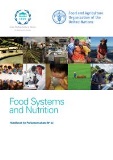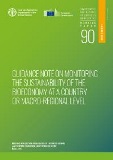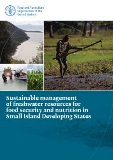Accelerate > Publications
Search this online library featuring the latest FAO publications, issue papers and briefs which offer up-to-date knowledge and innovative insights for SDG acceleration.

Catalysing the sustainable and inclusive transformation of food systems
2022
Food systems are intimately linked to our lives – through the food we eat, our nutrition and health, our livelihoods, jobs, and the environment and natural resources of the planet. The main challenge for food systems is to produce nutritious food for all while preserving our biodiversity and environment and ensuring equitable distribution of wealth. This brief provides a summarized version of the methodology used to conduct a global assessment of food systems in over 50 countries ...

Enabling substitution by wood-based products and contributing to the Sustainable Development Goals
2022
This report addresses the role of forest products in replacing fossil-based and GHG-intensive products. The overarching objective is to provide recommendations to strengthen the contribution of substitution by forest products to sustainable development. To that end, this report firstly provides an overview of the understanding of the bioeconomy and the role of forest products across the world...

Guidance on core indicators for agrifood systems – Measuring the private sector’s contribution to the Sustainable Development Goals
2021
The publication "Guidance on core indicators for agrifood systems – Measuring the private sector’s contribution to the Sustainable Development Goals" aims to provide practical information on how food and agriculture companies’ contribution to the SDGs can be measured in a consistent manner and in alignment with countries’ needs relating to monitoring the attainment of Agenda 2030. The indicators are further intended to serve as a tool to assist governments in...

The White/Wiphala Paper on Indigenous Peoples' food systems
2021
This White/Wiphala paper on Indigenous Peoples’ food systems is the result of collective work by Indigenous Peoples’ representatives and experts, scientists, researchers, and UN staff. Over 47 different units, organizations, and institutions have contributed to the Paper from the seven socio-cultural regions.

Maximizing nutrition in fisheries and aquaculture using a food systems approach - An evidence-based literature review
2021
This literature review is one of a series of four sector-specific reviews aimed at informing the development of guidance notes for the integration of nutrition across the crops, fisheries and aquaculture, forestry and livestock sectors in 12 sub-Saharan African countries. The present literature review focuses on mainstreaming nutrition in fisheries and aquaculture using a food systems approach.

Maximizing nutrition in livestock using a food systems approach - An evidence-based literature review
2021
This literature review is one of a series of four sector-specific reviews aimed at informing the development of guidance notes for the integration of nutrition across the crops, fisheries and aquaculture, forestry and livestock sectors in 12 sub-Saharan African countries. The present literature review focuses on mainstreaming nutrition in the livestock sector using a food systems approach.

Food systems and nutrition - Handbook for parliamentarians N°32
2021
This handbook was prepared by the Inter-Parliamentary Union and the Food and Agriculture Organization of the United Nations, in collaboration with the Scaling Up Nutrition (SUN) Movement, the World Health Organization (WHO), the United Nations Children's Fund (UNICEF) and the African Union Development Agency’s New Partnership for Africa’s Development (AUDA-NEPAD).

How to mainstream sustainability and circularity into the bioeconomy? A compendium of bioeconomy good practices and policies
2021
This Compendium outlines 250 sources of good practices and policies. It covers the entire continuum of economic sectors that have a stake in biological knowledge and resources. The Compendium, therefore, highlights the wide range of aspects that are included in the concept of the bioeconomy.

Guidance note on monitoring the sustainability of the bioeconomy at a country or macro-regional level
2021
This guidance note describes a series of general steps to establish an effective and robust system to monitor the sustainability of the bioeconomy in a given country or macro-region. This note builds on lessons learned from existing experiences of national and macro-regional bioeconomy monitoring systems. It was jointly developed by the Food and Agriculture Organization of the United Nations (FAO) and the European Commission’s Joint Research Centre (JRC),...

Minimum dietary diversity for women. An updated guide to measurement - from collection to action
2021
This publication is an update to the 2016 FAO/FHI 360 joint publication MDD-W: A Guide to Measurement. It includes guidance on the most accurate and valid methodologies on collecting, analyzing, interpreting, and presenting data on women’s dietary diversity, for use in research, impact assessment and large-scale, health and nutrition surveys such as the Demographic Health Survey (DHS), to generate nationally representative data, that are comparable over time and across countries.

The State of the World’s Land and Water Resources for Food and Agriculture 2021 – Systems at breaking point
2021
Satisfying the changing food habits and increased demand for food intensifies pressure on the world’s water, land and soil resources. However, agriculture bears great promise to alleviate these pressures and provide multiple opportunities to contribute to global goals. Sustainable agricultural practices lead to water saving, soil conservation, sustainable land management, conservation of natural resources, ecosystem and climate change benefits....

Maximizing nutrition in crop production using a food systems approach - An evidence-based literature review
2021
This literature review is one of a series of four sector-specific reviews aimed at informing the development of guidance notes for the integration of nutrition across the crops, fisheries, and aquaculture, forestry, and livestock sectors in 12 sub-Saharan African countries. The present literature review focuses on mainstreaming nutrition in the crops sector, using a food systems approach.

Progress on change in water-use efficiency - Global status and acceleration needs for SDG indicator 6.4.1, 2021
2021
The global indicator on water-use efficiency tracks to what extent a country’s economic growth is dependent on the use of water resources, and enables policy and decision-makers to target interventions at sectors with high water use and low levels of improved efficiency over time.

Sustainable management of freshwater resources for food and nutrition security in Small Island Developing States
2021
This study investigates how freshwater management can contribute to food and nutrition security (FNS) in Small Island Developing States (SIDS). It contributes to FAO’s Global Action Programme, which prioritises an integrated approach to freshwater management on FNS in SIDS.

Renewable energy for agri-food systems: Towards the Sustainable Development Goals and the Paris Agreement
2021
While energy has a key enabling role in food system transformation and innovation in agriculture, its current use is unsustainable because of the high dependence on fossil fuels and frequent access to energy in developing countries. The challenge is to disconnect fossil fuel use from food system transformation without hampering food security. In this context, IRENA and FAO jointly developed this report on the role of renewable energy used in food chain to advance energy and food security...

A multi-billion-dollar opportunity – Repurposing agricultural support to transform food systems
2021
Public support mechanisms for agriculture in many cases hinder the transformation towards healthier, more sustainable, equitable, and efficient food systems, thus actively steering us away from meeting the Sustainable Development Goals and targets of the Paris Agreement. This report sets out the compelling case for repurposing harmful agricultural producer support to reverse this situation, by optimizing the use of scarce public resources...

Climate change, biodiversity and nutrition nexus
2021
This paper identifies entry points within agri-food systems to improve biodiversity and diets, two levers that can be used to enhance nutrition and optimize environmental sustainability while ensuring social equity, especially of the most vulnerable people. It also presents recommendations for concrete actions by key stakeholders – governments, academia, civil society, private sector, and development partners –to build resilient, inclusive, and sustainable agri-food systems. KEYWORDS:

Legislating for an ecosystem approach to fisheries – Revisited
2021
The ecosystem approach to fisheries (EAF) is a risk-based management process for the planning, management, development, regulation and monitoring of fishing and fishing-related activities. EAF addresses ecological consequences of fishing as well as social, economic and institutional aspects of fisheries sustainability. Adequate legislation and regulatory frameworks are key to successful implementation of the EAF.

Consumer organizations and the right to adequate food - Making the connections
2021
Consumers are a powerful force for change towards a sustainably developing world that leaves no one behind and respects the human rights of all. This publication is aimed at making the connections between the important work of consumer organizations and the realization of the right to adequate food, increasing the visibility of these organizations and highlighting their importance to food security, healthy diets and food systems transformations.

The State of Food Security and Nutrition in the World 2021 - Transforming food systems for food security, improved nutrition and affordable healthy diets for all
2021
In recent years, several major drivers have put the world off track to ending world hunger and malnutrition in all its forms by 2030. The challenges have grown with the COVID-19 pandemic and related containment measures. This report presents the first global assessment of food insecurity and malnutrition for 2020 and offers some indication of what hunger might look like by 2030 in a scenario further complicated by the enduring effects of the COVID-19 pandemic.
Browse by SDG
- SDG1: No Poverty
- SDG2: Zero Hunger
- SDG3: Good Health & Well-being
- SDG4: Quality Education
- SDG5: Gender Equality
- SDG6: Clean Water & Sanitation
- SDG7: Affordable and Clean Energy
- SDG8: Decent Work and Economic Growth
- SDG9: Industry, Innovation and Infrastructure
- SDG10: Reduced Inequalities
- SDG11: Sustainable Cities and Communities
- SDG12: Responsible Consumption and Production
- SDG13: Climate Action
- SDG14: Life Below Water
- SDG15: Life on Land
- SDG16: Peace, Justice and Strong Institutions
- SDG17: Partnerships for the Goals
Browse by Better
Browse by Priority Area
- Innovation for Sustainable Agriculture Production
- Blue Transformation
- One Health
- Small-Scale Producers' Equitable Access to Resources
- Digital Agriculture
- Healthy Diets for All
- Nutrition for the Most Vulnerable
- Safe Food for Everyone
- Reducing Food Loss and Waste
- Transparent Markets and Trade
- Climate Change Mitigating and Adapted Agrifood Systems
- Bioeconomy for Sustainable Food and Agriculture
- Biodiversity and Ecosystem Services for Food and Agriculture
- Achieving Sustainable Urban Food Systems
- Gender Equality and Rural Women's Empowerment
- Inclusive Rural Transformation
- Agriculture and Food Emergencies
- Resilient Agrifood Systems
- Hand-in-Hand Initiative
- Scaling up Investment
